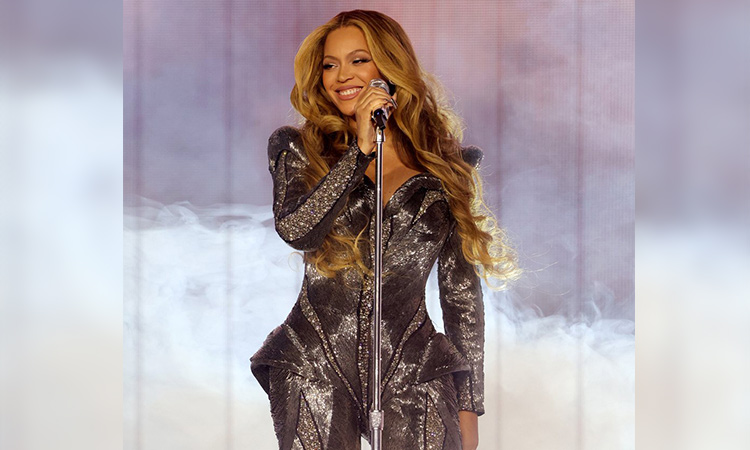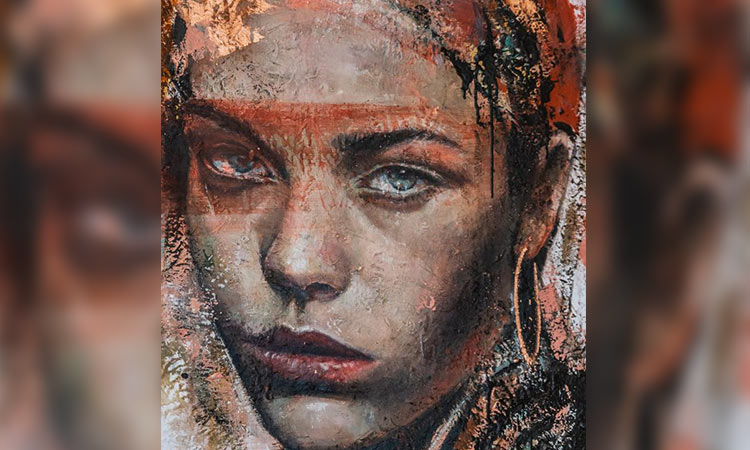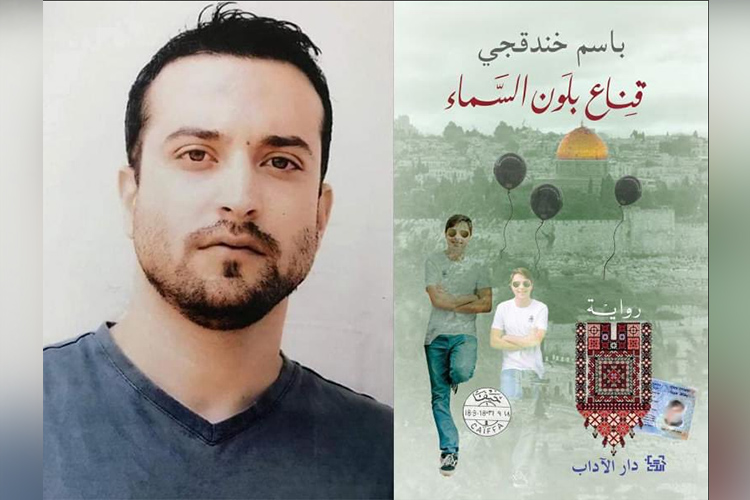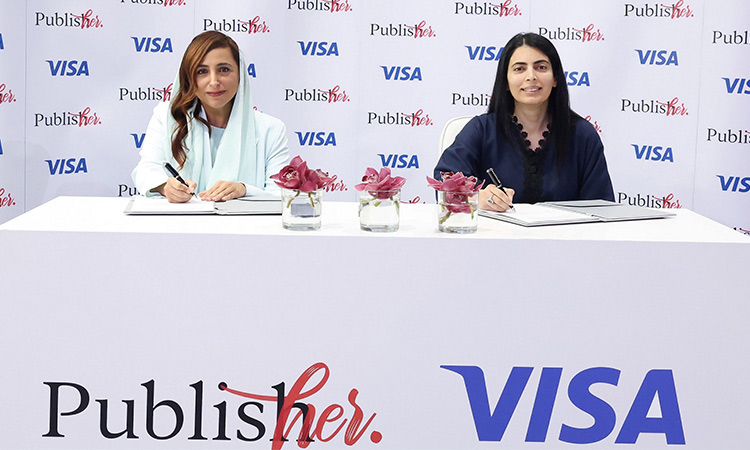Beautiful minds converge in Dubai to share their stories
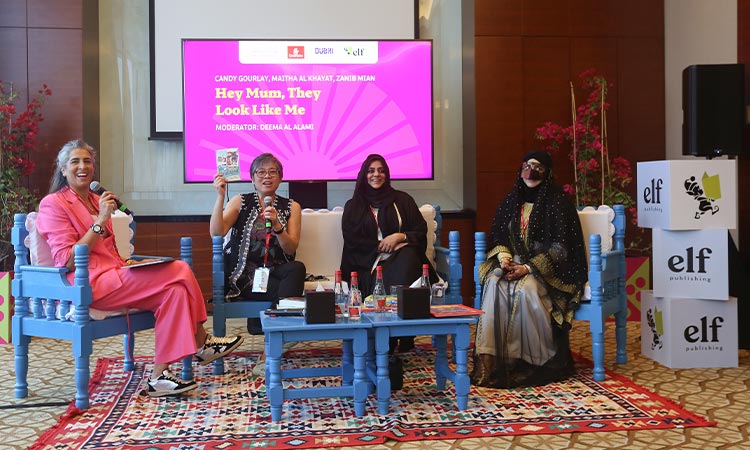
Deema Al Alami (left), Candy Gourlay, Zanib Mian, and Maitha Al Khayat at the Emirates Airline Festival Literature event in Dubai, on Friday. Kamal Kassim / Gulf Today
Mariecar Jara-Puyod, Senior Reporter
Literature is a SHE – Significant Human Experience – and in a world topsy-turvy and convoluted with bias and prejudice birthing to stigma as among the ubiquitous reasons, three Asian mothers – have breached barriers – as the cliché goes. Having dove into the realm of children’s books – as all of them had realised the zero availability of illustration books and novels genuinely mirroring their heritage whereby their own kids would relate to and imbibe, they have even surpassed expectations in the world of publishing.
Maitha Al Khayat is an Emirati from Ras Al Khaimah, an entrepreneur and mother of five. Her “My Mum’s Amazing Socks” was netted from her conversation with the librarian at the usual drop-off of her children in school, and; garbed with the traditional black abaya and the niqab, she wittily responded that she could be identified with her jazzy socks.
That, as a child, she used to be the director of her figment of imagination’s stage plays with her kin-and-kith, she has become a prolific writer. “My Own Special Way” and “Turn Off The Lights” had been adjudged “Best Book” during the “Children’s Forum” in Riyadh, Saudi Arabia in 2011 and “Best Book” during the “Publisher’s Forum” in Sharjah in 2016, respectively.
Born-and-raised in Davao City, Mindanao, Philippines, Candy Gourlay was a journalist before settling down as a housewife in the UK. She had published six books.
“Tall Story,” “Shine,” and “Bone Talk” have either been shortlisted or had become the top choice by award-giving bodies that include the “National Children’s Book Award of the Philippines,” “Crystal Kite Award for Europe,” Crystal Kite Award for the British Isles,” “Costa Book Award,” and “Carnegie Medal.” A sweet revenge, after anagent in London rejected a draft.
That agent incidentally, after snatching one children’s book from the shelf, told her: “Hey, I really enjoyed your book. You’re really funny. But, there’s a problem, you’re a Filipino. Look at this book, there’s this white English boy, an English old man, in an English setting; where are you in the story?”
Growing up in the UK, Pakistani Science teacher Zanib Mian self-published her first children’s book “The Muslims” and took home the “Little Rebels Award.” With the book recognised and re-titled “Planet Omar,” she has since then written other books, the plots and twists of which are about an ordinary Muslim Pakistani family’s daily grind and values.
All three conversed with educational consultant Deema Al Alami at the January 31 to February 6 “Emirates Airline Festival of Literature – Hey Mum, They Look Like Me Conversations.”
Gourlay recounted that while her voraciousness in reading stemmed from her childhood orientations to its worth and the libraries they had as a family and outside, she also had noticed then that books were all about “white children, there were no characters like me and I thought Filipinos were not allowed to be in the books.
To Al Alami’s query about their respective wish for all publishers worldwide, Gourlay replied: “I think the publishing world is stuck in space where they think they have an idea of what is normal and because for so long white people have dominated publishing; it is all about money, right? And so the white people have dominated the publishing world.
To this day, parents and parents of colour think that the normal is that books are for white people. What we are doing is that we are normalising. We are normalising difference and difference does not mean that you see how different we are. It is that you might see that we might don’t look the same; but, our stories are the same. We feel the same. We think the same. Never fear us.”
She eventually flashed her “Ferdinand Magellan.” That UK publisher allowed her to have on the cover the Portuguese navigator’s bubble thought that he had discovered what is now the Philippines, there was also the bubble thought from the local chieftains and their well-armed warriors that they had been thriving there prosperously way ahead of him for centuries: “In the US, they removed the Filipinos on the cover because it was seen as a risk. They were afraid that it would offend the right-leaning groups.”
A talk by Gourlay in previous book fairs let Mian pursue her childhood writing passion: “Very similar to Candy’s experience, I always wanted to write. In high school, whenever I wrote, the characters I made up always had names like Richard, Sarah, Judy. I never thought to write a character that was from my background because that was just the way I perceived books and stories.”
As a mother and bedtime stories being among the duties and a high, Mian found herself inventing stories focusing about their own people and their orientations: “My children resonated to these compared to the books I read to them.”
Early on, Mian said: “I did reach out to publishers. But there were rejections. They were talking about book list; about diversity; about publishing being a business like what Candy was saying. That those books are not going to make them any money. That was 2007.” Mian added there were doubts on whether she “was writing too much or too little about her religion like “including the five prayers but did it anyway.”
Al Khayat said: “I always also found books only with white people. I also noticed that there were books published about the UAE and about Emirati characters by Westerners. I thought, how was that happening; why not me writing about it. As a Business graduate, I also saw the need for it.”
Among her struggles was about some publishers asking her to tame her writing to avoid feedbacks such as too much of Islamisation. Al Khayat cited an instance when her “Love in Ramadan” encountered the thumbs down which was automatically changed when she laid down the accompanying spreads of illustrations: “That book has so far been my best seller. It is making money.”
